Ukraine war: The friends who fought Russia's invasion
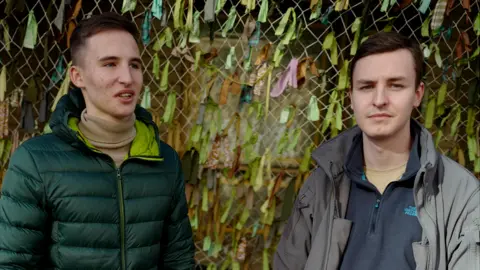 BBC/Jeremy Bowen
BBC/Jeremy BowenWar transforms individuals, as well as nations.
When the Russian army loomed over Ukraine at the end of February 2022, two university students, Maxsym Lutsyk and Dmytro Kisilenko, decided that they could not sit idle when their country was threatened. Maxsym was 19, Dmytro was 18.
I met them at a volunteer centre in central Kyiv on the day they signed up to fight. They took their big step into the unknown dressed to go to a festival, not to war. Dmytro had a yoga mat to sleep on.
The older volunteers, saying goodbye to wives and children, could barely raise a smile. Young men, not long out of school, not needing to shave much, were laughing and joking, full of bravado. I suspected they didn't feel as brave as they wanted to look.
Twelve months later, I caught up with Dmytro and Maxsym in the cold winter sun back at the volunteer centre.
"Well, actually there was a lot of fear," Dmytro admitted. "I'm not going to lie because I hadn't experienced anything like that before. There were a lot of pessimistic news and we were preparing for the worst. And it was mostly like a mixture of bravery… and in our guts we felt that not everything will be all right."
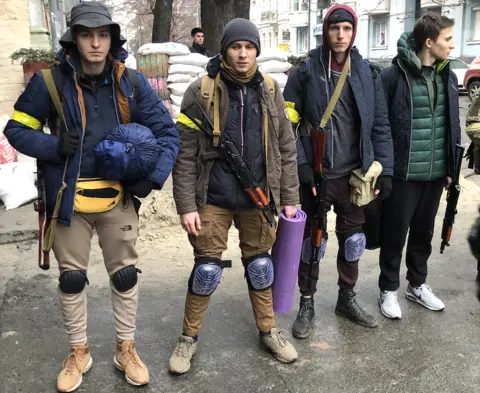 BBC/Jeremy Bowen
BBC/Jeremy BowenMaxsym agreed, and many Ukrainians to whom I've spoken had the same sort of thoughts.
"A year ago, we had a lot of fear in our hearts and even in our brains. We understood that it will be pretty dangerous to became soldiers, to try to fight with guns. But we also had courage and we had some stupid bravery, and it helped us to overcome our fear.
"We understood that it will be very bad for us to stay in some shelters, not act in the battle. And it will be bad for us if Russians would occupy Kyiv or other territories of Ukraine. They would kill us or put us in prison because of our political views."
They were not joining a winning army. The Americans and their allies were expecting a rapid Russian victory, followed by an insurgency that they were preparing to support.
Their attitudes changed rapidly after Ukraine had shown how well it could fight with old Soviet-era weapons and a sprinkling of modern ones that Nato had supplied.
Since then, Nato, led by the United States, has steadily broken its self-imposed limits on what it will supply. Main battle tanks are the latest upgrade. Ukraine wants modern warplanes next.
Dmytro sat in the cold sun outside the volunteer centre, marvelling at the change.
"The Russians have made their biggest mistake… Everyone knows their enemy now. And not only it's national unity, but it's international unity… And it's like someone told me two years ago that the United Kingdom, United States, all the European leaders will help us, and it's the world, Ukraine will be spoken in every television news, I wouldn't have imagined that."
The conflict forced the North Atlantic alliance to face up to the reality of a sharp and dangerous new division in Europe. The relationship with Moscow that had been under increasing strain for more than a decade snapped when President Putin ordered the invasion last February.
With Ukraine, its people and Europe propelled into a new and dangerous era, the continent has come full circle from the hopeful years that followed the end of the Cold War. In 1989, six months before the Berlin Wall was toppled, the first President George Bush laid out the dream of a "Europe whole and free". It does not feel like that on the front lines in Donbas.
But Kyiv today is a city transformed from the shuttered, apprehensive place it was in the first few weeks after the invasion. Snow swirled around the crowds that packed the platforms at the main railway station. Wind that felt as if it had come off the coldest part of the steppe cut into thousands of women and children, about to become refugees, who were pushing to get onto trains heading west, away from the Russians.
Being there felt like watching a re-run of old newsreels from the 20th Century's darkest times. Barriers were blocking roads, welders were making tank traps from steel girders, and thousands of bottles were being filled with petrol to make Molotov cocktails to throw at the Russian tanks everyone expected.
At the moment, the capital has a veneer of normality. Shops are open, people with money can go to restaurants, and there is a rush hour. Of course, it is not normal, because the country is at war, and by mid-evening the streets are quiet.
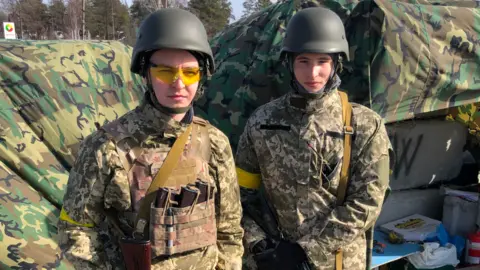 BBC/Jeremy Bowen
BBC/Jeremy BowenThe contrast between Kyiv and the battered front line towns in the war zones in the east and south is huge. Dmytro and Maxsym fought in the battle that forced a Russian retreat at the end of March. Since then, the pressure has mostly been off the capital, compared to the nightmarish months since the Russian focus turned to the Donbas and the approaches to the Crimean Peninsula in the south.
Maxsym and Dmytro are volunteers, and as students they are allowed to claim an exemption from compulsory military service. Under pressure from his family, Dmytro decided after the Russian withdrawal from Kyiv to go back to university. Now he volunteers to help with supplies for Maxsym and his other former comrades.
"It was a really hard decision. But when all your battle buddies, or when all your comrades are going to the east, they continue, they are like away, and you just left this community, you feel a bit odd."
His decision does not seem to have affected their friendship. Maxsym stayed with their unit, and in the months since then has been in some of the heaviest fighting of the war, in the battles in Donbas. He looks noticeably older and is more assertive.
I saw him in Bakhmut in the summer, as the Russians were starting to attack it. He had driven out of nearby Severodonetsk to get supplies for his unit. He went back that day, and not long before the town fell to the Russians, Maxsym was wounded.
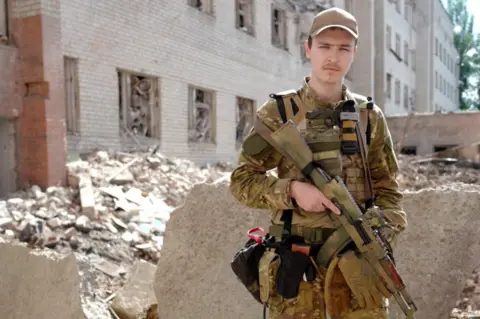 BBC/Jeremy Bowen
BBC/Jeremy BowenIt was, he said, his worst moment of the war. His position was hit by a strike from Russian heavy artillery, a 203mm Pion. His commander, who received Ukraine's highest award for valour, was killed. Maxsym was knocked cold and had severe concussion. The Ukrainian forces, outnumbered and outgunned, had to retreat across a river.
"The Russians destroyed all the bridges, doing intelligence to find places where we are crossing the river and they shelled these places. So staying there for longer period of time was possible, but many guys died there. And if we stayed for a longer period, many more guys would have died in a few weeks."
Maxsym believes that Russian soldiers arrived in Ukraine a year ago swallowing Kremlin propaganda that they would be welcomed as liberators and protectors of Russian speakers. The last year of fighting, he says, on battlegrounds like Severodonetsk and Bakhmut, has wiped out any Russian illusions about what it would take to beat Ukraine.
They understand, he said, that they don't have friends waiting for them. "They know that they will enter Bakhmut city only when they will destroy it, when they will kill every Ukrainian soldier who is defending it… They understand that they are fighting for territories and for some political reasons of their government."
Ukrainian soldiers who have served in the east do not have illusions either about an easy victory. The Russians have taken huge casualties. But they are still fighting, have capable electronic warfare and air defence systems and kill and wound many Ukrainians. The Kremlin's appetite for a war of attrition has not slackened.
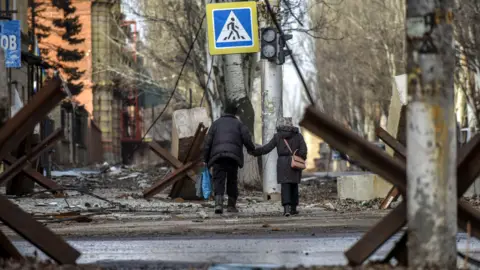 EPA
EPADmytro and Maxsym see victory the same way as President Volodymyr Zelensky. Every piece of Ukraine needs to be recaptured. Nato has massively increased its support. But giving Ukraine decisive combat power carries too many risks, in American minds especially. A time may come when Ukraine's allies push for negotiations.
Dmytro was firm. "Every inch of Ukrainian land which were recognized as Ukrainian in 1991 should be Ukrainian."
President Vladimir Putin believes Ukraine belongs to Russia. Ironically, the war he started is building the Ukrainian nation.
"We have a joke," Maxsym said. "Putin will be made a hero of Ukraine for the job he's done to unite Ukraine, to build our economy, to build our army, and to make the Ukrainian nation great."
Dmytro laughed. "But yeah, the war is horrible, but it's like the price for our unity and our country."
